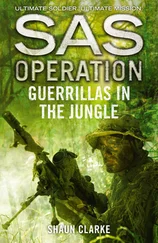V. Naipaul - Guerrillas
Здесь есть возможность читать онлайн «V. Naipaul - Guerrillas» весь текст электронной книги совершенно бесплатно (целиком полную версию без сокращений). В некоторых случаях можно слушать аудио, скачать через торрент в формате fb2 и присутствует краткое содержание. Год выпуска: 1990, ISBN: 1990, Издательство: Vintage, Жанр: Современная проза, на английском языке. Описание произведения, (предисловие) а так же отзывы посетителей доступны на портале библиотеки ЛибКат.
- Название:Guerrillas
- Автор:
- Издательство:Vintage
- Жанр:
- Год:1990
- ISBN:978-0679731740
- Рейтинг книги:5 / 5. Голосов: 1
-
Избранное:Добавить в избранное
- Отзывы:
-
Ваша оценка:
- 100
- 1
- 2
- 3
- 4
- 5
Guerrillas: краткое содержание, описание и аннотация
Предлагаем к чтению аннотацию, описание, краткое содержание или предисловие (зависит от того, что написал сам автор книги «Guerrillas»). Если вы не нашли необходимую информацию о книге — напишите в комментариях, мы постараемся отыскать её.
Guerrillas — читать онлайн бесплатно полную книгу (весь текст) целиком
Ниже представлен текст книги, разбитый по страницам. Система сохранения места последней прочитанной страницы, позволяет с удобством читать онлайн бесплатно книгу «Guerrillas», без необходимости каждый раз заново искать на чём Вы остановились. Поставьте закладку, и сможете в любой момент перейти на страницу, на которой закончили чтение.
Интервал:
Закладка:
Roche stood beside her while she read.
She said, “Is he really writing a novel? Is that the novel, do you think?” She took out a writing pad from below some papers.
Somebody said, “Yes?”
And Jane turned to see the boy with the Medusa head, the boy with the pigtails of aggression, the boy with the twisted face, the tormented red eyes. He was standing in the doorway in his jeans, jersey, and canvas shoes. He moved aggressively toward them.
She was grateful for Roche’s coolness.
Roche said, “It’s Bryant, isn’t it? Where’s Jimmy, Bryant?”
The boy didn’t answer. He came to the desk; he gathered the writing pad and letter and other papers together and put the blue-tinted glass ash tray on them. He went to the couch and began to refold the newspaper.
Roche said, “Where’s Jimmy, Bryant?”
And when Bryant spoke, over his shoulder, it was almost with a shout. “Why you ask me?”
Roche said, “We’ve come to see Jimmy, Bryant.”
“He’s in town.” And then Bryant sat down on the couch and began to sob. “He’s in town, he’s in town.” His eyes were red: the red of aggression turned out to be the red of weeping.
Roche sat on the arm of the couch. “What’s happened?”
Bryant said, “They kill Stephens.”
Jane said, “ Killed ?”
“When?” Roche said. “I haven’t seen the papers today. Is it in the papers?”
Bryant leaned back on the couch, turned his head to one side, and looked up at the ceiling. He was sobbing; he was waiting to be comforted.
Roche said, “Is it in the papers?” Then he said to Jane, “Meredith didn’t say anything about it. He should have told me.”
“Not in the papers,” Bryant said, wiping his eyes with a long finger, a thin, crooked finger. “It happen early this morning. They was waiting for him. On the radio they say he draw first. They was waiting for him. Watching the mother house.”
“Meredith knew!” Roche said, standing up. “Meredith knew!” The fact seemed important to him; it was like the main shock, overriding all the rest of Bryant’s news. He said, “Is that where Jimmy has gone?”
“The police was giving up the body this afternoon. They taking it from the mortu’ry to the mother house. I didn’t want to go.”
Roche said to Jane, “I think I should go.”
Bryant rolled his head on the back of the couch and used his long finger to wipe the rim of his eyes. “I should go too. But I don’t think I can stand it.”
“I’ll give you a lift.”
Jane wanted to cry: No!
Bryant said, “Leave me here.”
Jane said, “I want to go home.”
“Leave me here,” Bryant said, looking up at the ceiling.
“Jane!” Roche ordered. “Let us go.”
She started at his tone. He was already walking, brisk, athletic, his pale khaki trousers seeming looser around his waist; and she hurried after him. Yet when they were in the car — the sweat instantly breaking out on their faces and backs: the air heated, though the windows had been left open, the seats blazing — he went still.
He put his hands on the wheel and said, addressing himself, “I must drive carefully. In times like this one must drive carefully.”
And very slowly, as though he was indifferent to Jane’s reaction, as though he was alone in the car, he began to drive along the narrow empty road, sitting tense at the wheel, studying the asphalt surface, sometimes broken at the edge, sometimes overgrown, loosened into gravel here and there by tufts of browned grass. Jane was silent; it was as though she too was alone. The sunlight was yellowing; it softened the wall of bush that bounded the flattened wasteland of stunted shrubs and collapsed long grass. Slowly, though not as slowly as when they started, they approached the highway. The scorched hills appeared, dark-red and brown, smoking in many places. The slanting sun picked out every dip on the hills, every fold and wrinkle. They turned onto the highway, black and smooth from traffic.
Roche said, “I think I should go. It must be terrible in that house now.”
There were not many cars on the road. The factories were closed. Far away, deep in the brown fields, there was a scattering of parked cars. The trunks of these cars were open, and the drivers could be seen, tiny, isolated, intent figures, cutting grass for the animals they kept at home. In open spaces in the little concrete-and-tin settlements children played, kicking up dust.
“Meredith knew ,” Roche said. “They stopped me on Friday, you know, and they searched the car.”
He was half addressing Jane now, but she acknowledged nothing.
Past the junked cars in the sunken fields, past the factories, past more country settlements, the suburbs, they approached the city, the rubbish dump smoking yellow-gray, the smoke uncoiling slowly in the still afternoon, rising high and spreading far, becoming mingled with the pink pall from the bauxite loading station, the whole shot through with the rays of the declining sun. Sunlight gilded the stilted shacks that seemed to scaffold the red hillsides. The land began to feel choked. But the shantytown redevelopments were subdued; those repetitive avenues of red earth showed little of their usual human overspill. There were few trucks amid the smoke and the miniature multicolored hills and valleys of the rubbish dump, and not many scavengers. On each fence post a black carrion corbeau sat undisturbed; others on the ground hopped about awkwardly, two feet at a time.
Jane rolled up her window, to keep out the oily smoke and the deep dead smell.
Roche said, “Picking the carcass clean. They’ll pick the carcass clean.”
Fixed in the posture of alertness, though no longer driving slowly, still concentrating on the road as though watching for obstructions there, he did not sufficiently notice that the line of traffic he had been following had thinned out; and it was some time before he saw that he was entering a quiet city. They crossed the concrete canal that drained the ever rising swamp over which this part of the city had spread. But there had been no Sunday-afternoon “swagger” groups on the bridge, no plump young women in plastic curlers, no men with shirts out of their trousers and open all the way down.
No refrigerated trailers were unloading at the market. There were no groups of vendors and porters preparing, in an atmosphere of the caravanserai, for the long night and the early-morning market. Instead, half a dozen police vans were drawn up in the dusty market yard, and policemen stood in groups close to their vehicles.
Roche said, “I know that something is being prepared for me. They searched me on Friday. They saw me at the house.”
Jane said, “I want to go home.”
She rolled down her window. Fresher air blew in.
Abruptly he turned into a cross street, one of those that cut through the center of the city.
He said, “I must go. They’ll believe that I knew.”
He came to the main square and he saw it as he had never seen it before, empty, without people or cars, the wooden stalls in the center roughly shuttered. Between the square modern buildings, he saw tiled mansard roofs, corrugated-iron roofs in faded stripes of red and white, stylish finials, decorated wrought-iron balconies: domestic features of the upper parts of older buildings that normally didn’t draw attention to themselves but were now thrown into relief by the emptiness below. No restaurant vans or coconut carts, no queues at the bus stops, no crowds waiting for route taxis at corners: a stripped, sunlit square, with a spread of litter in the open gutters and little dust eddies on the wide intersections. He saw police trucks in the shadowed streets leading out of the square. He saw groups of policemen. He saw rifles and tin helmets.
Читать дальшеИнтервал:
Закладка:
Похожие книги на «Guerrillas»
Представляем Вашему вниманию похожие книги на «Guerrillas» списком для выбора. Мы отобрали схожую по названию и смыслу литературу в надежде предоставить читателям больше вариантов отыскать новые, интересные, ещё непрочитанные произведения.
Обсуждение, отзывы о книге «Guerrillas» и просто собственные мнения читателей. Оставьте ваши комментарии, напишите, что Вы думаете о произведении, его смысле или главных героях. Укажите что конкретно понравилось, а что нет, и почему Вы так считаете.












